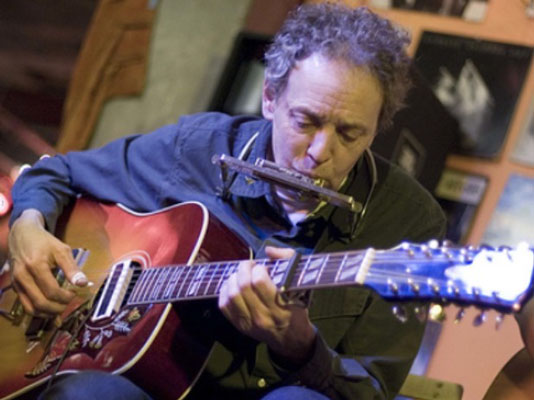THE REPLACEMENTS

Photo by Stacy Shwartz
Slim Dunlap interview by John Wisniewski
(February 2023)
Bob Dunlap was a Minneapolis fixture who played in indie rock bands and worked at the fabled First Avenue club before he was asked to join the Replacements in 1987, after Bob Stinson was fired from the group, playing alongside founders Paul Westerberg, Tommy Stinson and Chris Mars. Rechristened as "Slim," he toured and played on the final two 'Mats albums, Don't Tell A Soul (1989) and All Shook Down (1990). After the 'Mats imploded, he joined the Georgia Satellites and did his own solo albums- The Old New Me (1993), Times Like These (1996). After a 2012 stroke sidelined him, the Replacements (without Slim but with Paul/Tommy/Chris) briefly reunited to record 2013's Songs for Slim to benefit him, including two of Dunlap's songs and led to three years of shows done by Paul and Tommy (followed by the band ending again). With the help of his wife Chrissie, Slim talked about his storied career and current condition.
PSF: Who are some of your favorite guitarists when you were younger?
SD: Buddy Holly, Scotty Moore, Chuck Berry, Chet Atkins and James Burton.
PSF: How did you start working with Curtis A and Spooks?
SD: I auditioned for the band Thumbs Up in 1976 and was hired. We played power pop and soul music-a four piece band with Curt singing and playing rhythm guitar. We toured the five state ballroom circuit, along with a few local bars. Peter Jesperson says he started Twin Tone Records so he could record us. The band evolved into Spooks.
PSF: What was the Minneapolis music scene like at that time?
SD: It was mostly cover bands. Thumbs Up played a few of Curt's originals but they didn't go over with the crowd. The New Wave changed everything and pretty soon everyone started a band and was writing songs.
PSF: First Avenue was where you worked at and played at. What made the club special to you and the people in the city?
SD: My wife (she smiles at this) booked bands and gave a lot of encouragement to bands who made it big, like Prince and Soul Asylum (nudging him in a different direction now). First Avenue is the best club in America and Minneapolis is the best music city. Really proud. Love Steve (McClellan, the talent buyer and manager). Everything happened here because of him. Lots of bars I've played in exist to sell beer, but at First Avenue, the music came first.
PSF: What did you think of The Replacements before you worked with them?
SD: Loved them. Everyone did.
PSF: How did you meet Paul Westerberg?
SD: I met him at the Longhorn Bar, and saw his band there for the first time.
PSF: It is said that turned Paul down to join The Replacements and then changed your mind. What happened?
SD: Chrissie said I should take the job (Chrissie: "he was reluctant to leave me to tour since we had three small children"). Paul also made sure I was okay with it.
PSF: You have your own style of playing but the old Replacement songs were done with Bob Stinson. Did you feel like you were replacing Bob Stinson when you played the songs live?
SD: No one could replace Bob. I learned his parts but did it my way.
PSF: What was the experience like playing with The Replacements?
SD: It was both exhilarating and depressing- a roller coaster ride. It fulfilled a lot of my dreams and opened doors for me. I'm incredibly grateful to Paul and Tommy and Chris for giving me a chance.
PSF: Could you tell us about the recording Don't Tell a Soul. What were the sessions like?
SD: Paul was under a lot of pressure from the record company and management- we all felt it and wanted to help him. There were too many starts and stops and the momentum kept breaking. We finally put out a very good record though.
PSF: It is said that All Shook Down was a Westerberg solo album. Did it feel that way?
How was the recording different from the previous record?
SD: I'm on it was more than people think. It was me and Paul. Quiet, less madness and booze.
PSF: Did it feel like at that point that Paul was ready to leave the band?
SD: Yes, he was done.
PSF: Could you tell us about recording your solo album The Old New Me?
SD: It was great. I had a large stash of songs and wrote a lot more on the road, with lots of time in a hotel room. Thanks to Peter [Jesperson] for believing in me.
PSF: What was it like working with Dan Baird and the Georgia Satellites? How did that compare to the Replacements?
SD: Night and Day. No pressure. Dan is my friend and very easy to be around. And the gigs were fun. I felt like I'd already passed the audition. and could just do what I love- play guitar. I was tired of touring though, and wanted to be home.
PSF: Tell us about recording your second solo album Times Like This?
SD: Well, you have your whole life to write that first record. The follow up is harder but that pushed me to work harder to craft a good song.
PSF: What would you say is your favorite Replacements album?
SD: Let it Be.
PSF: How are you doing now and will you play again?
Chrissie Dunlap: I can answer that. He is paralyzed and can only move his head. He will never play again. He remains in good spirits despite his disability and pain. He has been hospitalized over one hundred times and as long as he is home with me, he feels pretty good.